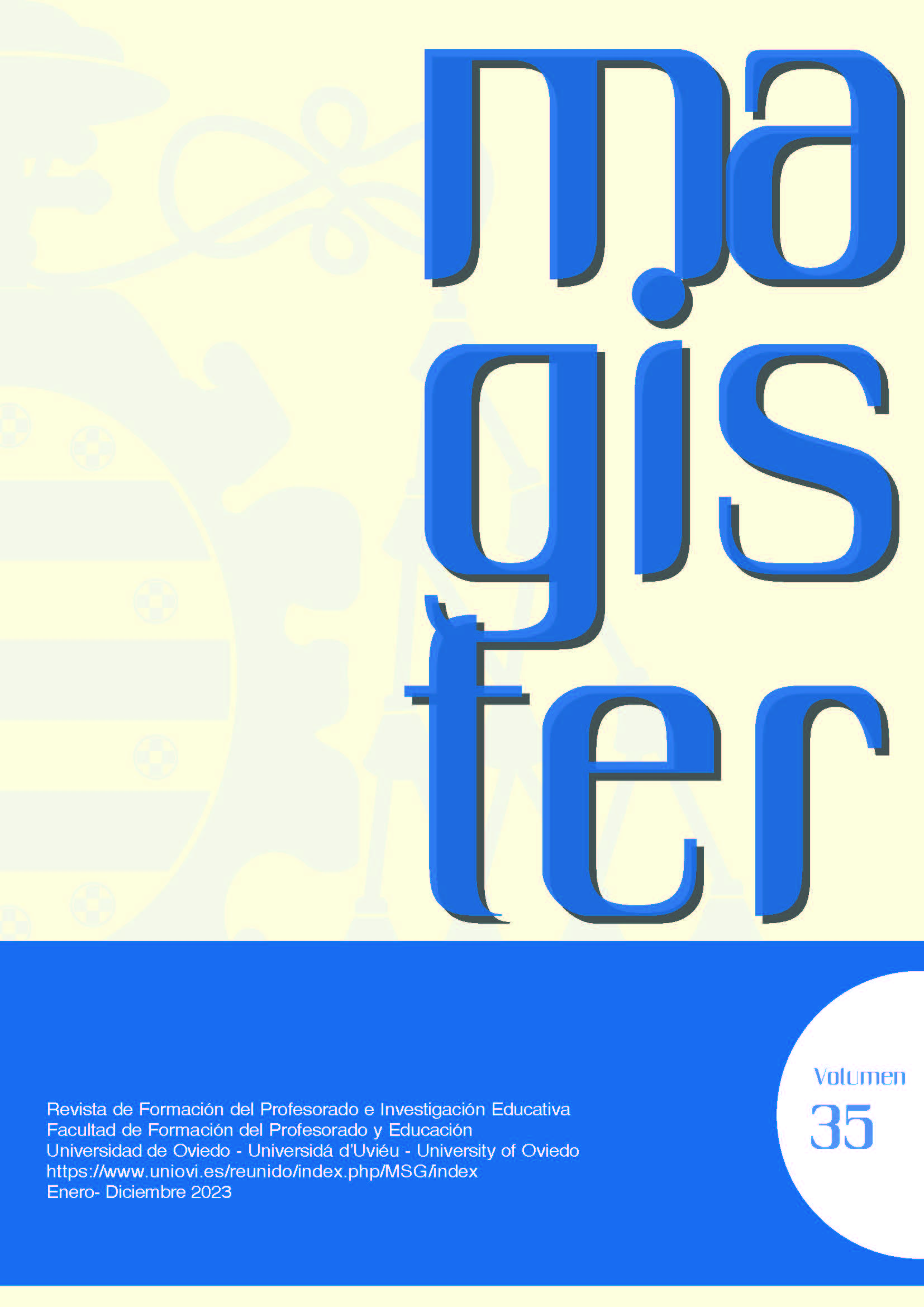Abstract
Teamwork is part of one of the transversal skills to be developed during teachers’ training process. Moreover, it constitutes one of the fundamental capacities needed by research teachers with reflective positions about their practices and professional interactions. This research aims to analyze students and teachers’ perceptions about the development of teamwork skills in teachers’ research training. From a mixed approach, with preeminence of qualitative methods, students and teachers’ of a Public University of Honduras narratives have been analyzed. The results show a variety of elements of an attitudinal order, situations of the socio-affective context and pedagogical conditions that were present during the development of collaborative teamwork as part of the training process in research. The already mentioned results have led to the conclusion that the implementation of the program for the development of research competence has had a favorable impact on the achievement of teamwork skills in trainee teachers.
References
Brenes, P. M., Iglesias, M. J., Lozano, I. y Arroyo, S. (2022). El Desarrollo de Habilidades Actitudinales para la Labor Investigadora de Estudiantes en Formación Docente: El Aprendizaje Autónomo, Crítico y Creativo. Paradigma: Revista De Investigación Educativa, 29(47), 93–114. https://iniees.vrip.upnfm.edu.hn/ojs/index.php/Paradigma/article/view/147
Bardin, L. (2002). Análisis de contenido. Akal.
Bartlett, L. y Vavrus, F. (2016). Rethinking case study research: A comparative approach. Taylor & Francis.
Bisquerra, R. (2004). Metodología de la investigación educativa. La Muralla.
Camús, M., Iglesias, M., Lozano, I. (2023). La Comunicación Didáctica el Reto del Profesorado Universitario para Mantener la atención del Alumnado. En A. Medina y G. L. Huber (coord.), Identidades migrantes y formación del profesorado: investigación educativa para el encuentro entre culturas fronterizas (pp. 175-193). Universitas.
Cecchini, J. A., Fernández-Río, J., Méndez-Gimenez, A., González, C., Sánchez-Martínez, B. y Carriedo, A. (2020). High versus low-structured cooperative learning. Effects on prospective teachers’ regulation dominance, motivation, content knowledge and responsibility. European Journal of Teacher Education, 44(4), 486-501. https://doi.org/10.1080/02619768.2020.1774548
Cochran-Smith, M., Grudnoff, L. Orland-Barak, L. y Smith, K. (2019). Educating Teacher Educators: International Perspectives. The New Educator, 16(1), 5–24. https://doi.org/10.1080/1547688X.2019.1670309
Cochran-Smith, M. y Lytle, S. (2009). Inquiry as Stance: Practitioner Research for the Next Generation, Practitioner Inquiry Series. Teachers College Press.
Flick, U. (2015). El diseño de Investigación Cualitativa. Ediciones Morata, S.L.
Flores, M. A. (2018). Linking Teaching and Research in Initial Teacher Education: Knowledge Mobilisation and Research-Informed Practice. Journal of Education for Teaching, 44 (5), 621–636. https://doi.org/10.1080/02607476.2018.1516351
Fombona, J., Iglesias, M. y Lozano, I. (2016). El trabajo colaborativo en la Educación Superior: una competencia profesional para los futuros docentes. Educ. Soc., 37(135), 519-538. https://doi.org/10.1590/ES0101-73302016147914
García Zapata, A. y Gaviria Cano, A. S. (2021). Creencias sobre las interacciones docente-estudiante en el aprendizaje colaborativo. Estudios Pedagógicos, 47(3), 303-319. http://dx.doi.org/10.4067/S0718-07052021000300303
González-Fernández, R., Zabalza-Cerdeiriña, M. A., Medina-Domínguez, M. y Medina-Rivilla, A. (2019). Modelo de Formación Inicial del Profesorado de Educación Infantil: Competencias y Creencias para su Capacitación. Formación Universitaria, 12(2), 83-96. https://dx.doi.org/10.4067/S0718-50062019000200083
Helgevold, N. (2016). Teaching as creating space for participation – establishing a learning community in diverse classrooms. Teachers and Teaching: Theory and Practice, 22(3), 315-328. http://doi.org/10.1080/13540602.2015.1058590
Hernández, R., Fernández, C. y Baptista, P. (2014). Metodología de Investigación (Sexta ed.). McGraw-Hill.
Huber, G. (2003). AQUAD Six for WINDOWS. Ingeborg Huber Verlag.
Juárez-Hernández, L. G. y Tobón, S. (2018). Análisis de los elementos implícitos en la validación de contenido de un instrumento de investigación. Espacios, 39(53), 23-30. https://www.revistaespacios.com/cited2017/cited2017-23.pdf
Kvale, S. (2011). Las entrevistas en Investigación Cualitativa. Ediciones Morata.
Latorre, A. (2008). La investigación-acción. Conocer y cambiar la práctica educativa. Graó.
Lee, W. y Yang, M. (2020). Effective collaborative learning from Chinese students' perspective: a qualitative study in a teacher-training course. Teaching in Higher Education, 28(2), 221-237. https://doi.org/10.1080/13562517.2020.1790517
Lillo, S. (2018). Acknowledging Potential in Preservice Teachers’ Collaborative Practices. Action in Teacher Education, 40(4),391-407. https://doi.org/10.1080/01626620.2018.1503977
Lincoln, Y. S. y Guba, E. G. (1985). Naturalistic Inquiry. Sage.
Pérez, G. (2007). Investigación Cualitativa. Retos e Interrogantes. Editorial La Muralla.
Puig, M., Hila, A., Gros, B. y Simon, B. (2020). Research competence and formative research in preservice teacher education. Contextos Educativos: Revista de Educación, 26, 239-259. https://doi.org/10.18172/con.4326
Romero-Martín, M., Castejón-Oliva, F., López-Pastor, V. y Fraile-Aranda, A. (2017). Evaluación formativa, competencias comunicativas y TIC en la formación del profesorado. Comunicar, 25(52), 73-82. https://doi.org/10.3916/C52-2017-07
Ruiz, J. (1999). Metodología de la Investigación Cualitativa (Segunda ed.). Artes Gráficas Ronteguí.
Saldaña Gómez, D. y González González, L. (2022). La práctica pedagógica en educación superior: una mirada desde los actores de la carrera de Educación Inicial (UNAE-Ecuador). Revista de Estudios y Experiencias en Educación, 21(46), 312-327. http://dx.doi.org/10.21703/0718-5162.v21.n46.2022.017
Sandoval, E., Toro, S., Poblete, C. y Moreno, A. (2020). Implicaciones Socioeducativas de la Creatividad a partir de la Mediación Pedagógica. Una Revisión Crítica. Estudios pedagógicos, 46(1), 383-397. http://dx.doi.org/10.4067/S0718-07052020000100383
Stake, R. E. (1999). Investigación con estudio de caso. Ediciones Morata.
Swanson, E., McCulley, L. V., Osman, D. J., Lewis, N. y Solis, M. (2019). The effect of team-based learning on content knowledge: A meta-analysis. Active Learning in Higher Education, 20(1), 39–50.https://doi.org/10.1177/1469787417731201
Tinsley, S. y Sheats, S. (2020). The role of teacher educators and university supervisors to help student teachers reflect: from monological reflection toward dialogical conversation. Reflective Practice International and Multidisciplinary Perspectives, 21(2), 171-182. https://doi.org/10.1080/14623943.2020.1716710
Wang, T., Lin, H., Wu, T. y Huang, Y. (2020). A Multimethod Approach for Supporting Reflection and Creativity in Online Collaborative Courses. Journal of Internet Technology, 21(4), 1097-1106. http://doi.org/10.3966/160792642020072104018
Van Katwijk, L., Jansen, E. y Van Veen, K. (2021). Pre-service teacher research: a way to future-proof teachers? European Journal of Teacher Education, 46(3), 435-455, https://doi.org/10.1080/02619768.2021.1928070
Villardón-Gallego, (2015). Competencias genéricas en educación superior. Metodologías específicas para su desarrollo. Narcea.

This work is licensed under a Creative Commons Attribution-NonCommercial-NoDerivatives 4.0 International License.
Copyright (c) 2023 Magister. Journal of Teacher training and Educational Innovation


